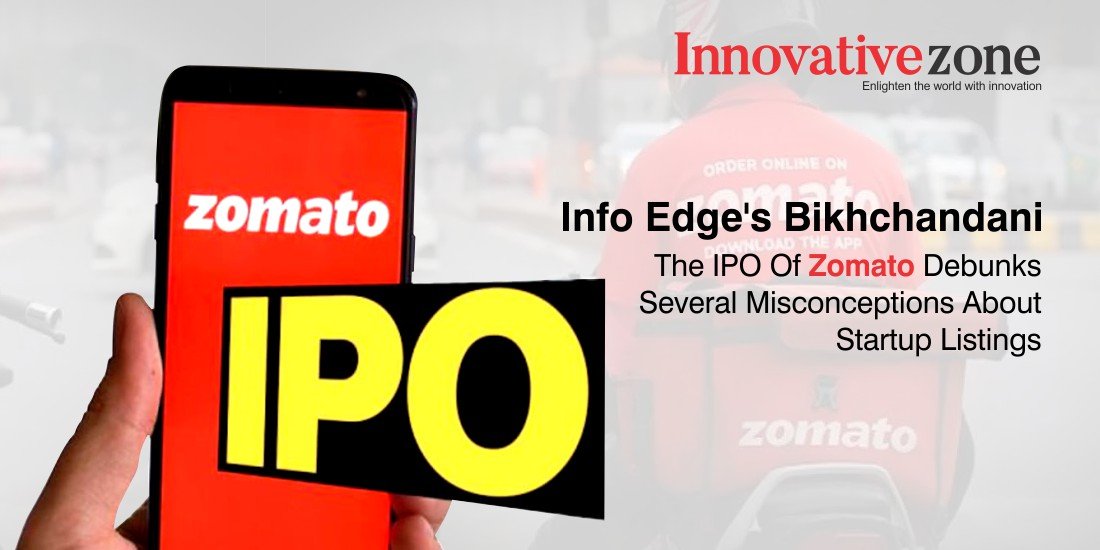Info Edge’s Bikhchandani: The IPO Of Zomato Debunks Several Misconceptions About Startup Listings
By – Ashwathy Nair
- In 2010, Bikhchandani issued Zomato’s first cheque for ₹4.7 crores and was the company’s sole investor in the first four rounds of investment.
- Zomato’s IPO demonstrated that internet firms with less than a 20% stake in the company may go public in India.
According to Info Edge founder Sanjeev Bikhchandani, Zomato’s spectacular launch on Dalal Street has debunked the idea that firms earn greater valuations when they list overseas (28th July).
He went on to say that the “extraordinary” interest in the IPO, particularly among millennials, demonstrates how people are ready to invest in companies that are losing money but have a good business strategy.
In 2010, Bikhchandani issued Zomato’s first cheque for ₹4.7 crores and was the company’s sole investor in the first four rounds of investment.
As part of Zomato’s offer for sale, Info Edge, which had about an 18.5 percent interest in the food delivery platform before the IPO, sold about 2.32 percent (49.3 million shares).
Bikhchandani, speaking at a Ficci event, said Zomato’s IPO proved that digital firms with less than a 20% stake in the company can go public in India.
“A firm that is rapidly developing, has a good, solid business strategy and a great brand franchise but is now losing money may go public in India and earn a market valuation that is equivalent to what it would have gotten if it had gone public in the United States,” he added.
Retail interest in the Zomato IPO was “unprecedented,” according to Bikhchandani.
“We received reports from online brokerages, hearing that we’ve had a record number of new account openings because there were people who had never invested in the stock market, who were probably millennials, under 30, Zomato customers… it is companies like this that will broaden the base of the equity markets, you are getting new investors,” he said.
Zomato shares were listed at ₹116 per share, a 53% premium to the IPO price of ₹76.
Many institutional investors came to India for the first time because they wanted a taste of the activity, according to Bikhchandani.
“I think that if Indian firms are not allowed to invest or list in other countries, the Indian startup ecosystem would perish (which is false). You can demonstrate clearly that well-run firms can go public in India, on Indian markets, and receive the valuations they deserve,” he explained.
He stressed that the “myth” of getting businesses listed in other countries for higher values have been debunked.
“This entire let’s move the business offshore. The idea that some investors advise their companies is poor advice for startups…your operation is in India, your market is in India, your customers are in India, but you’re incorporated and listed elsewhere. Five, ten years from now, there would be a massive regulatory complexity,” He went on to clarify.
Temasek India’s Deputy Head, Promeet Ghosh, shared the sentiments. According to Ghosh, Zomato’s IPO was a watershed moment not only for the platform but also for the signal that was sent out.
“…businesses with their corporate strategy, where they may not be profitable now, but they have created a very substantial, defensible business model in India and can go public. That is certainly reassuring to investors,” he stated
Many investors across the world are taking note of this, claiming that it indicates that there is interest in India and that this will pave the way for more similar listings in the future, he added.
Must Read:-
- Top 10 logistic Companies in India 2021
- Top 10 automobile companies in India 2021
- Top 10 fastest growing industries in the world 2021
- Top 10 most charitable person in the world 2021
- Top 10 logistic Companies in India – 2021
- Top 10 Company in the Corporate World
- Top 5 Most Fuel Efficient Car In India
- Start Small and go Big: Low-Investment Business Ideas 2021
- Top 10 Electrical Company in India 2021








